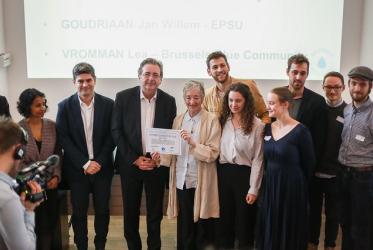United Protestant Church of Belgium
(Verenigde Protestantse Kerk in België / Eglise protestante unie de Belgique, EPUB)
This church traces its history back to the Reformation which had a great influence in the country. Political forces and the Counter-Reformation did not eliminate Protestantism entirely. But it found the necessary freedom for its development only after the independence of Belgium in 1830. New churches were then added to those which had survived difficult times. This was a result of evangelization by the Reformed churches in Switzerland, France and the Netherlands. From 1925 onwards two different strands developed in Belgian Protestantism. There were churches which participated in the worldwide ecumenical movement and in the Federation of Protestant Churches in Belgium, and others which stayed away from ecumenism. From 1962 onwards four churches realized an organic church union in two stages. In 1969 the Evangelical Protestant Church of Belgium united with the Belgian Conference of the United Methodist Church to form the Protestant Church of Belgium. In 1971 this church started union negotiations with the Reformed Church of Belgium (founded in 1837 as the Belgian Christian Missionary Church, mainly working in Wallonia, the French-speaking part of Belgium), which led in 1979 to the formation of the United Protestant Church of Belgium.
Roman Catholicism is the dominant religion of the nation. There are in the country more and more Orthodox churches, and large immigrant communities adhering to Islam. The UPCB is a minority church, but it contributes to the social and religious life of the people in several ways. It has created a few organizations which work towards the integration of refugees and migrants into society. Programmes of evangelization have been developed. The church sponsors radio and television work and maintains a missionary relationship with the Presbyterian Church in Rwanda. It is concerned with issues of development and economic justice. A considerable number of African students, in particular from Zaire and Rwanda, are enrolled in the theological faculty of Brussels. Since the Second Vatican Council the relations with the Roman Catholic Church have improved and deepened, and there is today an atmosphere of confidence and cooperation.
As a united church representing different traditions, the UPCB benefits from its close ties with the Protestant Church in the Netherlands, the Evangelical Church of the Rhineland (EKD, Germany) and the United Methodist Church.



